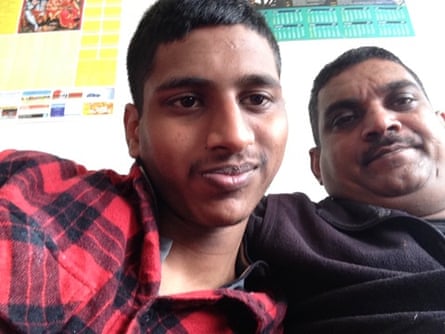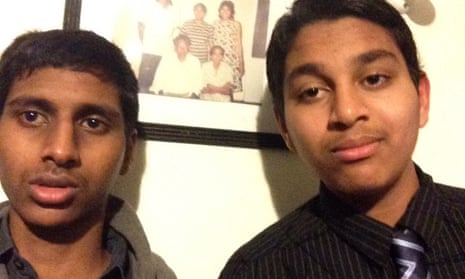An intellectually disabled Fijian man who requires full-time care from his family is due to be deported from New Zealand because the government says the cost of caring for him is too expensive.
Sagar Narayan, 20, has severe intellectual disabilities and requires help with washing, getting dressed and eating his meals.
All of Narayan’s care is provided by his immediate family in New Zealand, and he spends his days in the family home watching TV.
His family moved to Auckland from Fiji eight years ago to escape corruption and provide a better life for their four children. He has no relatives in Fiji able to care for him, and the government there has told his family it cannot look after him if he returns.
Narayan’s parents and his three siblings are permanent residents in New Zealand, but he has been ordered to make plans to leave the country by 27 October after Immigration New Zealand said his condition was too great a burden on the health system. His case was first reported by Newshub in New Zealand.
“There is nothing else they [Immigration New Zealand] can do but drag him out of the family home and put him on a plane to a country he has no recollection of,” said Alastair McClymont, the family’s lawyer, who has made half a dozen appeals to Immigration New Zealand on Narayan’s behalf.
“He doesn’t even understand what is going on, he doesn’t know what immigration is. He simply doesn’t know anything, he has the mental age of a six-year-old.”
Narayan’s father Lalit said the family had always looked after him at home and he has never required assistance from the state.
“He has a mental disability, that’s all: he is not a threat to the public or anything. He’s never needed to be cared for [by the government] or spent time in hospital. He doesn’t need assistance, we look after him,” he said.
“I don’t want the money from the government, I just want my son to stay with me, that’s all. I want them to give my son a chance to stay with his family.”
Peter Elms, the director of operations for Immigration New Zealand said Narayan’s application for residency in New Zealand was declined on health grounds, and “he has been unlawful in New Zealand since January last year and has been given until 27 October to make arrangements to leave the country”.
Elms added: “Subsequent appeals for ministerial intervention have been declined and a deportation order was served on Sagar in April this year. INZ has worked closely with Sagar’s family and lawyer throughout this process to facilitate his departure from New Zealand.”
In its most recent letter to the family Immigration NZ suggested Narayan – who cannot read or write – stay in touch with his New Zealand family from Fiji by “setting up a Skype arrangement”.

The New Zealand government routinely declines residency applications if it deems the applicant’s condition will impose “significant costs on New Zealand’s health services” in excess of NZ$41,000 (£22,000).
Narayan has been assessed as costing New Zealand NZ$16,000 a year though his lawyer says that figure is based on him attending a special school, which he is no longer eligible for since turning 20.
McClymont said the government’s refusal to grant residency to applicants on humanitarian or compassionate health grounds had become increasingly common under the incumbent government, and Narayan’s only hope now is if a Labour-led government emerges from ongoing coalition talks and takes a kinder view of his application to remain in the country.
Last year a prestigious Belgian mathematician left New Zealand after his stepson was declined residency because of his autism.
At the time associate professor Dimitri Leemans said Immigration New Zealand had broken the UN convention on human rights, and he no longer wished to live in a country that did not respect universal human rights.
Taking the case to the high court was an option for Narayan, said McClymont, and the family have started a givealittle page to begin raising funds for a final appeal.
This article includes content provided by Scribd. We ask for your permission before anything is loaded, as they may be using cookies and other technologies. To view this content, click 'Allow and continue'.
“These sorts of situations are now becoming very common and it is a reflection of the current government and their position in regards to children, relationships and people with disabilities,” said McClymont, who has worked in the field for more than 20 years.
Narayan’s family and lawyer have written to the Fijian government requesting care for him in a residential facility, but the Fijian government said it had no capacity to care for him. The family’s sole remaining relative in Fiji is in ill health herself.
“He has nobody, he has nothing,” said McClymont.
“The only option now is for his family to leave New Zealand with Sagar and return to Fiji. But then they would have to abandon their other children who are living here and studying and have citizenship. They are basically being forced to choose between their children.”
